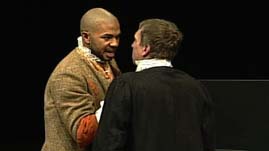Teachers' Domain - Digital Media for the Classroom and Professional Development
User: Preview



John Basil, founding member of the American Globe Theatre in New York City, directed graduate students from Penn State's School of Theatre in this production of selected scenes from William Shakespeare's Twelfth Night during Penn State's 2007 theatre season.
Jennifer Evans, Josie Gildow, and Gary Masquelier, English teachers from central Pennsylvania, wrote lesson plans based on these video segments.

In this video from Penn State's School of Theatre production of Twelfth Night, Feste, the clown, enters Olivia’s house. He sings a song; Sir Toby and Sir Andrew join in. Maria comes along to stifle their rowdiness and warn the men that Olivia is sending Malvolio to quiet them down.
Shortly thereafter, Malvolio arrives, insults Sir Toby and threatens to tattle on Maria to Olivia. Maria and Sir Toby are riled up by his behavior toward them. She intends to forge a love letter from Olivia to Malvolio, and she recruits Toby, Andrew, and Feste to help with the joke.
If the previous scene provided a glimpse of the dour nature of Malvolio, this scene establishes him as a spoilsport, as well as something of a tyrant. He rudely interrupts the merrymaking activities of Sir Toby, Sir Andrew, Feste the clown, and Maria. Interestingly, before Malvolio joins them, Maria, too, has asked the three men to quiet down so as not to disturb her sleeping mistress. But her rebuke does not raise tempers as Malvolio’s does. He is said to overstep his boundaries (he is a servant of Olivia, after all) when he chastises them all for being rowdy. They never call Maria on that; she’s a woman, of lower class, but an equal. She is able to hold her own. To compound the unattractiveness of this character, Malvolio is described as a Puritan. Puritans were the archenemies of dramatists, including Shakespeare. Play acting, and indeed drama in general, were regarded by Puritans as sinful, essentially a lie. Thus, their desire to close the theatres threatened Shakespeare’s very livelihood.
Although Sir Toby is content to openly show his contempt for Malvolio’s orders, Maria thinks of a better way to get back at him, in the process endearing himself to both Sir Toby and the audience.
Shakespeare throws an interesting question to the audience via Feste, the clown. Feste is often the voice of reason and wisdom, although no character in the play takes him seriously. As the scene begins, Feste asks the two gentlemen what kind of a song they would like to hear him sing.
(Lines 36-39)
Clown: Would you have a love song, or a song of good life?
Toby: A love song, a love song.
Andrew: Ay, ay, I care not for good life.
These lines are interesting to note for their commentary on love: Feste asks whether the men would like to hear a song about love or about “good life,” which could mean morality or happiness. Either way, Shakespeare seems to be suggesting that love is antithetical to those ideas.
(Lines 36-39)
Clown: Would you have a love song, or a song of good life?
Toby: A love song, a love song.
Andrew: Ay, ay, I care not for good life.
Is Shakespeare saying that love is immoral? unhappy? How does that notion reflect the larger themes of the play?
Characterization of Malvolio:
(Lines 146-153)
The devil a Puritan that he is, or anything constantly but a time- pleaser; an affectioned ass, that cons state without book and utters it by great swarths; the best persuaded of himself; so crammed, as he thinks, with excellencies that it is his grounds of faith that all that look on him love him; and on that vice in him will my revenge find notable cause to work.
What flaws does Maria see in Malvolio’s character? With these characteristics in mind, how will Malvolio likely respond to the forged love letter from Olivia?
Characterization of Toby and Andrew:
(Lines 177-181)
Toby: Good night, Penthesilea.
Andrew: Before me, she’s a good wench.
Toby: She’s a beagle true-bred, and one that adores me. What o’ that?
Andrew: I was adored once too.
What do these lines reveal about Toby’s feelings for Maria? What do they reveal about Andrew’s attitude toward love?
 Loading Standards
Loading Standards